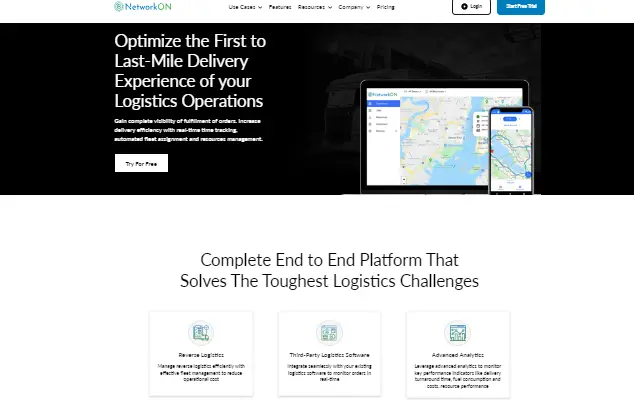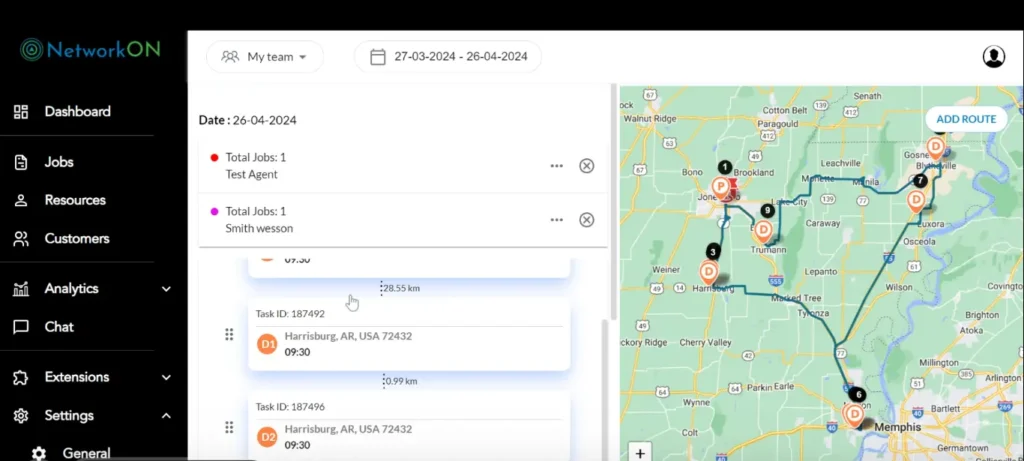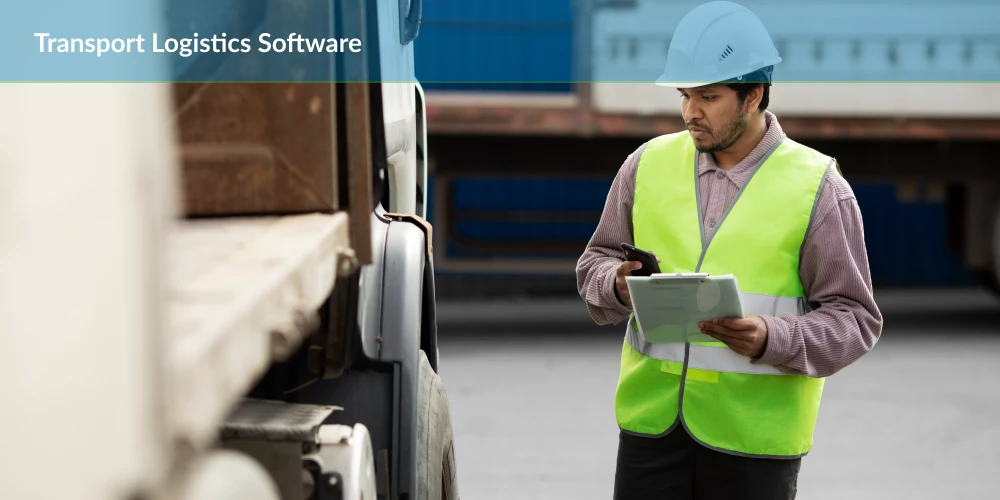Table of Contents
A resilient Transportation Management System (TMS) is central to the efficiency and success of a streamlined supply chain. The technological backbone is designed to optimize the complex process of transporting goods. Cloud computing enhances this sophisticated software by providing seamless access to data and analytics from any location. This advanced system goes beyond simple transport facilitation; it is engineered to serve as the central nervous system of logistics operations, integrating core functionalities such as route planning and optimization, carrier selection, freight auditing, payment systems, and real-time tracking of goods. With cloud computing, TMS ensures scalability, improved security, and uninterrupted connectivity, empowering businesses to make data-driven decisions in real-time.
For transportation and logistics companies, a TMS is not just a useful tool but a pivotal asset in maintaining the momentum of their supply chain. Its abilities to reduce costs, enhance efficiency, and provide invaluable data analytics, along with supporting intermodal freight transport, position transport logistics software as an indispensable element of its operational strategy.

The journey from logistical accessory to strategic imperative has been swift yet profound. In today’s global economy, the need for transport logistics software has evolved from a service that offers a competitive advantage to a fundamental necessity imperative for the survival and growth of logistic operations.
Before we move ahead, here are the key features of transportation logistics software:
| Delivery Planning | – Route modeling & optimization – Real-time route scheduling – Stop placement optimization – Impact analysis of route changes – Automated job scheduling & dispatching – Live delivery tracking & monitoring |
| Cost Analysis | – Freight cost calculation – Financial services integration |
| Logistics Support | – Integration with on-board monitoring devices – Centralized dashboard – Reporting & analytics |
Embrace the future as we delve into why transport logistics software has become the cornerstone of contemporary logistics management, driving efficiency, cost savings, and seamless business operations worldwide.
Inventory Management Integration: The Backbone of Logistics Excellence
The synergy between transportation and inventory management is the linchpin of logistics performance. Cloud computing enhances this integration by providing real-time visibility into stock levels and shipment status. Efficient inventory management is indispensable in transport logistics, where the balance of stock levels and delivery schedules demands precision and foresight. With cloud computing, businesses can streamline operations, reduce delays, and optimize supply chain efficiency through data-driven insights and automation.
The Indispensability of Efficient Inventory Management in Logistics
Logistics isn’t just about moving goods; it’s about moving them smartly. Overstocking ties up capital, while under-stocking leads to missed opportunities and customer dissatisfaction. This is where transport logistics software plays a crucial role in maintaining the equilibrium through advanced inventory management capabilities.
How Software Solutions Streamline Inventory Tracking and Control
Transport logistics software provides tools that allow for a seamless tracking process. These systems ensure that inventory levels are monitored in real-time, notifying managers of stock needs and helping to avoid costly stockouts or excesses.
- Automatic reorder points can trigger restocking processes.
- Barcode scanning reduces errors in inventory counts.
- Integrated analytics provide insights into inventory turnover rates.
Real-Time Inventory Visibility and Its Impact on Service Quality
With the integration of transport logistics software, businesses gain real-time visibility into their inventory. This transparency is critical in making informed decisions that enhance service quality, improve delivery timelines, and heighten customer satisfaction. Moreover, it paves the way for a leaner, more responsive supply chain.
The sophisticated interplay between inventory data and transportation processes enables logistics providers to anticipate client needs, optimize stock allocation, and ultimately, uplift the caliber of their services. Embracing transport logistics software with robust inventory management integration is not just about keeping up; it’s about setting the pace for the future of logistics.
Enhancing Fleet Management and Route Optimization
Transport logistics software plays a pivotal role in modern fleet operations. It helps businesses navigate the complexities of managing numerous vehicles and ensures that goods are delivered efficiently. These software solutions enable companies to achieve optimal performance and customer satisfaction by leveraging advanced algorithms and real-time data.

Role of Transport Logistics Software in Managing Fleet Operations
Managing a fleet involves many challenges, from vehicle maintenance to driver schedules. Transport logistics software provides a centralized platform to monitor and control all aspects of fleet management, reducing the manual effort required and minimizing errors. It permits businesses to monitor their vehicles closely, ensuring they are well-maintained, adequately fueled, and properly insured while simplifying compliance with transport regulations.
Benefits of Intelligent Route Optimization for Timely Deliveries
One of the greatest strengths of transport logistics software is its capability to optimize delivery routes. Intelligent route optimization considers traffic conditions, delivery windows, and vehicle capacities, ensuring drivers can complete deliveries quickly while consuming less fuel. This contributes to timely deliveries, enhances customer satisfaction, and significantly reduces transportation’s carbon footprint.

Real-Time Tracking and Visibility in Transportation
For businesses involved in transportation and logistics, real-time tracking isn’t just a feature; it’s an essential element of operational excellence. With the advent of new technological solutions, the ability to track fleet and freight movements in real time has revolutionized the way logistics companies manage their operations, providing significant value to both businesses and their customers.
The Importance of Real-Time Tracking for Businesses and Customers
Real-time tracking empowers businesses to enhance service delivery through precise, up-to-the-minute information on cargo location and estimated arrival times. This transparency is crucial for customer satisfaction and retention, reducing uncertainty and building trust. In an increasingly competitive market, companies that offer comprehensive tracking capabilities ensure a superior service experience, making it a pivotal aspect of transport logistics software.
Integration of IoT and Smart Devices for Enhanced Visibility
The integration of the Internet of Things (IoT) and smart devices has pushed the boundaries of visibility within the supply chain. Sensors and trackers within containers, vehicles, and even parcels relay data continuously, allowing logistics providers to monitor conditions like temperature, humidity, and handling in real-time. This level of insight is invaluable for businesses managing perishable or sensitive goods, ensuring product integrity from warehouse to delivery.
Application of AI and Machine Learning to Track Fleet Movement
The application of artificial intelligence (AI) and machine learning is taking real-time tracking to new heights. Modern transport logistics software harnesses these technologies to predict traffic patterns, optimize delivery routes, and proactively manage delays. By analyzing vast amounts of data, AI can facilitate smarter decision-making, minimize risks, and enhance operational efficiency. Additionally, machine learning algorithms improve over time, continually refining the system for even more precise tracking capabilities.
Smarter Warehousing through Software Solutions
As the backbone of successful supply chains, warehousing plays a pivotal role in shaping the efficiency of transport logistics. With the advent of advanced transport logistics software, cloud computing has revolutionized warehousing by enabling real-time data access and seamless system integration. Warehousing has been transformed from a simple storage solution to a hub of innovation and strategic management. These software solutions, powered by cloud computing, equip warehouse managers with the tools to overhaul traditional practices, enhance inventory accuracy, and optimize workflow efficiency. By leveraging cloud computing, businesses can ensure scalability, improved security, and smarter decision-making in logistics.
How Software Solutions Modernize Warehouse Management Processes
Integrating transport logistics software into warehousing operations has revolutionized how inventory is managed, tracked, and manipulated. These systems enable better decision-making and efficiency by offering comprehensive visibility and control over stock levels, location, and movement. Operations are streamlined through automated processes, reducing the margin for error and boosting productivity.
The Utilization of Analytics and Reporting for Inventory Insights
To stay competitive, warehouses must harness the power of data. Transport logistics software provides rich analytics and customized reporting tools that offer deep insights into inventory trends. Managers can anticipate market demands, adapt to changes swiftly, and optimize stock levels to satisfy customer needs without overcapitalizing inventory.
Automation and Robotics in Warehousing – The Future of Logistics
- Machine Learning Algorithms: Software systems equipped with machine learning can predict peak times, optimize inventory layout, and manage resources effectively.
- Automated Guided Vehicles (AGVs): AGVs increase efficiency by automating the movement of goods within a warehouse, reducing human error and labor costs.
- Robotic Picking Systems: These systems accelerate the picking process while ensuring accuracy and reducing the physical strain on workers.
Such technological advancements are not a distant reality but an operational advantage reshaping warehousing logistics. Embracing automation and robotics through transport logistics software is not just an upgrade; it is becoming an industry standard for those aiming to lead in logistics.
Comprehensive Order Management Systems
Transport logistics software is fundamental in revolutionizing how businesses manage their orders from initiation to delivery. An efficient Order Management System (OMS) is a crucial component that enhances logistics operations. By centralizing the entire order process, OMS provides an all-encompassing platform that simplifies transaction complexities and drives customer satisfaction.
Streamlining the Order-to-Delivery Cycle with Transport Logistics Software
Transport logistics software excels at refining the order-to-delivery cycle. By automating order entry, processing, and fulfillment, the software significantly reduces the time and effort required to manage orders. It also facilitates better coordination among sales, logistics, and distribution teams, leading to a seamless workflow from one end to the other.
Incorporation of CRM for Personalized Customer Service Experiences
By integrating Customer Relationship Management (CRM) into the order management system, transport logistics software can offer personalized customer service experiences. This integration allows for an in-depth understanding of customer preferences, order history, and feedback, which can be leveraged to provide tailor-made services, strengthen customer loyalty, and encourage repeat business.
Efficiency in Shipping and Delivery Scheduling
The backbone of any successful logistics operation is its ability to ensure timely, efficient shipping and delivery. Transport logistics software is revolutionizing how companies schedule and manage their delivery operations. With cutting-edge features, companies can now orchestrate their shipping processes with greater precision and reliability.
Improving Workflow with Automated Scheduling Tools
Introducing automated scheduling tools into the transportation workflow can significantly enhance efficiency. These tools streamline the scheduling process, eliminating manual errors and saving time. By leveraging automation, logistics coordinators can easily adjust to incoming orders and handle unexpected changes in the supply chain without disrupting the delivery timelines.
Minimizing Delays Through Predictive Analytics and Reporting
Predictive analytics and robust reporting capabilities within transport logistics software enable businesses to analyze historical data and anticipate potential delays. With this insight, companies can proactively tweak their shipping strategies to avoid common pitfalls, ensuring a smoother and faster delivery service. Predictive analytics also aids in maintaining inventory levels, reducing the likelihood of stockouts or excess inventory, which could complicate the delivery schedule.
Leveraging Software for Adaptive Delivery Resource Management
Adaptive delivery resource management is a game-changer in the logistics industry. Businesses can dynamically allocate resources such as vehicles and delivery personnel using transport logistics software based on real-time demand and conditions. This flexibility ensures that resources are used effectively, leading to cost-saving and improved customer satisfaction due to timely deliveries. Software for adaptive resource management allows for scalability and agility in operations, adapting quickly to the ever-changing market demands.
- Automated tools ensure a streamlined scheduling process.
- Predictive analytics anticipate and mitigate potential delays.
- Adaptive resource management optimizes resource allocation.
Transport logistics software is invaluable for businesses seeking to elevate their shipping and delivery logistics. By automating, analyzing, and adapting, companies can achieve unprecedented scheduling and resource management efficiency, ultimately satisfying customers and staying competitive in the market.
Optimize Freight Brokerage and Forwarding With Advanced Transport Logistics Software
Transport logistics software plays a pivotal role in redefining the efficiency and reliability of freight brokerage and forwarding services. By leveraging cutting-edge platforms, businesses can streamline operations, reduce manual errors, and enhance productivity.
The Role of Software in Freight Brokerage and Forwarding Operations
Modern freight brokerage and forwarding operations demand real-time data and seamless communication channels. Transport logistics software provides a centralized platform that facilitates the effective exchange of information between shippers, carriers, and forwarders, ensuring that the right goods reach their destinations on time and within budget.
Enhancing Collaboration Through Logistics Platforms
Collaboration is key in the fragmented landscape of freight management. Transport logistics software simplifies cooperation across different stakeholders, allowing them to easily share schedules, documentation, and updates. This transparency increases trust and efficiency, fostering a more collaborative supply chain ecosystem.
How Transport Logistics Software Bridges Gaps in the Supply Chain
Information silos and disconnected processes often plague supply chain networks. Transport logistics software acts as a bridge, seamlessly connecting these gaps. It ensures that every element of the supply chain, from warehouse to final delivery, is harmoniously aligned, leaving no room for costly delays or miscommunication.
- Provides visibility into every stage of the shipping process.
- Facilitates efficient route planning and carrier selection.
- Enhances accuracy in freight billing and audit procedures.
- Improves load matching and asset utilization through intelligent platforms.
Cost Reduction and Efficiency: The Financial Impact
Transport logistics software streamlines operations and is a critical tool for cost control within logistics enterprises. By leveraging cutting-edge analytics and automation, businesses can identify cost-saving opportunities and significantly improve their financial outcomes.
Identifying Cost-Saving Opportunities through Software Analytics
Utilizing transport logistics software, companies gain access to robust data analytics that pinpoint inefficiencies in the supply chain. These insights enable businesses to optimize operations and reduce wasteful spending. Features such as automated reporting and performance monitoring provide a clear picture of where savings can be made, ensuring companies remain competitive by operating at peak efficiency.
Case Examples of Logistics Companies Achieving Cost Efficiency
Real-world applications of transport logistics software tell a compelling story of cost reduction. For instance, logistics companies have reported significant savings by automating manual processes and reducing paperwork and administrative overhead. These organizations have also decreased miles driven and fuel consumption through intelligent route planning, leading to substantial cost savings and an improved bottom line.
Strategic Route Optimization and Asset Utilization to Lower Expenses
One of the standout features of transport logistics software is its ability to optimize routing and maximize asset utilization. By calculating the shortest and most fuel-efficient routes, software solutions ensure drivers save time and companies save money. Additionally, the optimal use of loading capacities can lead to fewer trips and, hence, reduced total shipping costs. This strategic approach translates into a direct financial advantage in an industry where margins are pivotal.
- Enhanced Delivery Scheduling: Timely deliveries lead to customer satisfaction and repeat business, positively affecting the company’s profitability.
- Real-Time Fleet Monitoring: Immediate insights into fleet performance help avoid costly breakdowns and maintenance issues.
- Effective Inventory Management: Reduces the chance of overstocking or understocking, thereby minimizing holding costs.
The proper employment of transport logistics software provides a powerful means to transform financial metrics through sustained cost reduction and efficiency enhancement. Companies that capitalize on these tools can emerge as leaders in the ever-evolving logistics landscape.
Compliance, Security, and Risk Management in Transport Logistics
As the backbone of commerce, transport logistics bears a significant burden of ensuring that products are moved securely, efficiently, and in compliance with an ever-growing body of regulatory requirements. At the forefront of this charge are sophisticated transport logistics software solutions designed to uphold the highest data security standards, mitigate risks, and maintain strict adherence to compliance.
Ensuring Data Security and Regulatory Compliance through Transport Software
With the rise of cyber threats and stringent data protection laws, curating sensitive information has become a paramount concern. Transport logistics software is critical in maintaining data integrity, leveraging advanced encryption methods and access controls to shield data from unauthorized entities. Moreover, these systems ensure businesses stay abreast of regulations such as GDPR, HIPAA, and others, automating compliance tasks to minimize human error and the risk of non-compliance penalties.
Role of Software Solutions in Proactively Managing Logistic Risks
Risk is omnipresent in the volatile sphere of logistics. Effective transport logistics software confronts this challenge directly, providing comprehensive risk assessment tools that preemptively identify potential disruptions. These platforms facilitate swift adjustments to routing, carrier selection, or even warehousing configurations, aiding logistics managers in taking decisive action to prevent or mitigate adverse events that could impact the supply chain.
Importance of Having a Robust Compliance and Security Framework
The integrity of logistic operations hinges on establishing a robust compliance and security framework. This ecosystem encompasses policies, procedures, and technologies safeguarding assets, data, and personnel. Transport logistics software acts as the central nervous system within this framework, continuously monitoring for anomalies, streamlining compliance reporting, and ensuring all operations are conducted securely and in line with legal and ethical guidelines.
- Enhanced data protection through state-of-the-art security protocols
- Regular updates and patches to maintain regulatory compliance
- Detailed audit trails for comprehensive oversight and traceability
- Advanced risk management tools to forecast and mitigate potential supply chain disruptions
A successful transport logistics strategy must incorporate robust software solutions poised to tackle the complexities of compliance, security, and risk management head-on. As a guardian of efficiency and an enabler of safe, lawful trade, transport logistics software represents a linchpin of modern supply chain operations.
Pro Tip: Harness logistics optimization software for proactive risk management, ensuring data security, regulatory compliance, and swift response to potential disruptions, thereby safeguarding supply chain integrity and efficiency.
Driving Sustainability with Green Logistics Solutions
Transport logistics software is not only transforming operations but also a key player in promoting sustainability within the industry. By leveraging advanced features, companies can significantly lower their environmental impact and embark on a greener path without sacrificing efficiency or performance.
How Software Helps in Achieving Sustainability Goals
Environmental responsibility is at the forefront of modern logistics operations. Innovative transport logistics software assists businesses in tracking and reducing emissions, managing waste, and optimizing resource use. This paves the way for more sustainable supply chain practices and helps companies meet their CSR objectives.
Optimization of Transportation to Reduce Carbon Footprint
One of transport logistics software‘s most substantial benefits lies in its ability to optimize routes. Companies can significantly reduce their carbon footprint by calculating the most efficient pathways and minimizing unnecessary travel. Furthermore, optimizing loads and consolidating shipments also contribute to lower emissions and enhanced fuel efficiency.
The Rise of Eco-Friendly Approaches in Logistics and Their Software Enablement
The logistics sector is witnessing a paradigm shift by integrating eco-friendly practices. Software solutions enable this transition by providing tools for better energy management, supporting electric vehicles in fleets, and improving overall environmental performance. As a result, businesses that adopt these technologies gain a competitive edge and contribute to creating a more sustainable future.
- Monitoring energy consumption and identifying reduction opportunities
- Support for alternative fuels and electric vehicle integration
- Resource management to ensure minimal wastage
- Data analytics for continuous sustainability performance improvement
Pro Tip: Utilize transport logistics software to optimize routes, reduce emissions, and enhance sustainability, gaining a competitive edge while promoting environmental responsibility.
The Future of Logistics: AI, Machine Learning, and Collaborative Platforms
The landscape of transport logistics is constantly evolving, and the driving forces behind this transformation are Artificial Intelligence (AI), Machine Learning (ML), and Collaborative Platforms. These technologies are not merely trends; they are revolutionizing how logistics companies approach challenges and optimize their operations for the future.
Predicting the Future: AI’s Influence on Transport Logistics
AI is shaping the future of transport logistics. With its ability to process and analyze vast amounts of data, AI equips logistics companies with predictive capabilities, enabling them to forecast demand, optimize routes, and anticipate potential disruptions. This predictive power helps businesses stay ahead of the curve, ensuring efficiency and reliability in the delivery process.
The Importance of Machine Learning in Optimizing Logistics Operations
Machine learning, a subset of AI, further enhances logistical efficiency by continuously improving through data. Logistics operations are teeming with data that, when leveraged by ML algorithms, provides invaluable insights for decision-making. From warehouse layout optimization to dynamic pricing in freight brokerage, machine learning’s adaptive nature drives cost savings and service improvement.
The Growth of Collaborative Logistics Platforms and Community-Based Problem-Solving
Collaborative logistics platforms represent the next step in the evolution of transport logistics. These platforms foster a community approach to logistics, where shared information and resources lead to collective problem-solving and increased efficiencies. By pooling data and insights, companies can address common challenges, scale solutions, and innovate faster.
The E-commerce Logistics Surge and Software Response
Amid a significant boom in e-commerce, transport logistics software has become a pivotal asset in addressing the growing demands for efficient and reliable delivery services. As online sales volumes skyrocket, businesses increasingly use advanced software solutions to scale up their logistics operations while maintaining quality service.
Addressing the E-commerce Logistics Boom with Scalable Software Solutions
The surge in online shopping has necessitated logistics that can scale and adapt swiftly. Scalable transport logistics software offers versatility to handle varying order volumes, from seasonal spikes to the consistent growth of e-commerce. By leveraging the power of logistics software, companies can optimize inventory management, enhance shipping processes, and improve the overall customer experience.
The Challenge of Last-Mile Delivery and How Software Offers a Competitive Edge
Last-mile delivery represents one of the most challenging and costly aspects of the e-commerce logistics chain. Transport logistics software provides businesses with a powerful competitive edge in this area. By optimizing delivery routes, orchestrating efficient dispatch schedules, and ensuring real-time communication with customers, software solutions transform the last-mile hurdle into an opportunity for exceptional service delivery.
- Route optimization to reduce delivery times and costs
- Automated dispatching to efficiently allocate delivery resources
- Real-time tracking to enhance customer transparency and satisfaction
Integration Challenges and Solutions for E-commerce Businesses
E-commerce operations often struggle to integrate disparate systems and platforms within their logistics framework. Effective transport logistics software bridges these gaps, seamlessly connecting e-commerce platforms, supply chain management, inventory systems, and delivery networks. As a result, businesses enjoy a unified and streamlined logistics workflow—critical for thriving in a competitive e-commerce landscape.
- Simplifying integration with customizable and compatible software solutions
- Automating data exchange between e-commerce and logistics systems
- Enhancing analytics and reporting for data-driven logistics decisions
Cutting-edge transport logistics software stands at the heart of the e-commerce logistics surge, offering solutions that transform challenges into growth opportunities. In an environment where prompt and precise delivery is key, these software solutions are not just an option but a strategic necessity.
Key Takeaways
- The Backbone of Efficiency: Transport logistics software serves as the central nervous system of logistics operations, optimizing processes such as route planning, inventory management, and real-time tracking to enhance efficiency and reduce costs.
- The integration of transport logistics software provides businesses with real-time visibility into inventory and freight movements, enabling informed decision-making, timely deliveries, and heightened customer satisfaction.
- Shaping the Future of Warehousing: Advanced software solutions are reshaping warehousing practices through automation and robotics, streamlining processes, reducing errors, and boosting productivity to meet the demands of modern logistics.
- Transport logistics software not only identifies cost-saving opportunities but also ensures compliance with regulations, enhances security, and mitigates risks, contributing to improved financial outcomes and operational integrity.
- Leveraging transport logistics software enables businesses to reduce their environmental footprint, optimize transportation routes, and adapt to the evolving landscape of e-commerce logistics, ensuring competitiveness and sustainability in the long run.
Conclusion
As we’ve explored throughout this comprehensive guide, transport logistics software plays an indisputable role in honing modern logistics’ competitive edge. From elevating inventory management to optimizing routing and ensuring real-time visibility, advanced technological solutions have significantly refined the facets of logistics operations.
Transportation and logistics software integrates a wide range of essential functions to streamline operations across the supply chain. From packaging and labeling to procurement and traffic management, it optimizes processes like cross-docking, freight audit, and intermodal freight transport. The software also supports truckload and less-than-truckload shipping, vendor management, and sales quotes while enhancing customer reviews and communication through instant messaging. It facilitates human resources management, including professional certification, and can even accommodate regional logistics needs and hybrid bicycle deliveries, ensuring efficiency at every stage of the process. With features covering consolidation and manufacturing, this software is a vital tool for modern businesses in the logistics sector.
With the logistics industry under constant pressure to evolve and adapt to the relentless pace of demand and complexity, transport logistics software continues to grow more sophisticated. These tools address current challenges and are designed to scale with your company, anticipating future innovations such as AI and machine learning applications. Moreover, the integration of 3PL (Third-Party Logistics) software further enhances the capabilities of transport logistics solutions, providing comprehensive support for outsourcing logistics functions, managing multiple supply chain partners, and optimizing collaboration across the entire logistics ecosystem. The inclusion of 3PL logistics software expands the scope of logistics management, enabling businesses to streamline operations and leverage external expertise for enhanced efficiency and flexibility.
In an era where efficiency and sustainability are paramount, transportation and logistics companies must stay ahead. Investing in advanced software solutions is not just an option—it is a strategic imperative for those who wish to remain competitive and successful in this ever-changing landscape.
If your business is looking to expand its logistics strategy, NetworkON invite you to contact us for a detailed consultation on the best transport logistics software solutions tailored to your needs. Experience the transformative power of our logistics software and see how it can revolutionize your operations first-hand.
Frequently Asked Questions
Q1: What is transport logistics software, and why is it important for businesses?
Transport logistics software is a comprehensive solution designed to optimize various aspects of logistics operations, including route planning, inventory management, real-time tracking, and more. It is essential for businesses as it enhances efficiency, reduces costs, and provides valuable insights for informed decision-making, ultimately improving customer satisfaction and competitiveness.
Q2: How does transport logistics software contribute to sustainability in the logistics industry?
Transport logistics software helps businesses reduce their environmental footprint by optimizing transportation routes, minimizing fuel consumption, and streamlining operations. By leveraging advanced features, companies can lower emissions, manage waste, and promote more sustainable supply chain practices without compromising efficiency or performance.
Q3: What role does 3PL logistics software play in enhancing transport logistics solutions?
3PL Logistics software integrates seamlessly with transport logistics solutions, providing additional support for outsourcing logistics functions, managing multiple supply chain partners, and optimizing collaboration across the entire logistics ecosystem. It expands the scope of logistics management, enabling businesses to streamline operations and leverage external expertise for enhanced efficiency and flexibility.
Q4: How can businesses leverage transport logistics software to stay competitive in the e-commerce landscape?
In the booming e-commerce industry, efficient logistics operations are crucial for success. Transport logistics software helps businesses optimize delivery routes, automate dispatching, and enhance real-time tracking, addressing the challenges of last-mile delivery and integration with e-commerce platforms. By leveraging these software solutions, companies can offer exceptional service delivery, adapt to changing demands, and thrive in the competitive e-commerce landscape.





0 Conversations